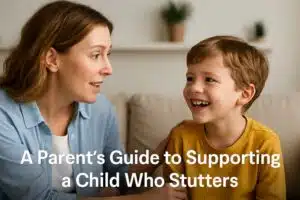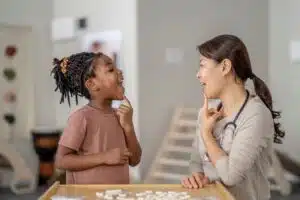Rouzan Dishoian MS, CF-SLP
Speech therapy is often perceived as a fun and playful activity for young children, where they engage in games and activities that appear to be pure amusement. While therapy has a play based approach for young kiddos, it is essential to understand that speech therapy is not just play. It is a structured, evidence-based approach to address speech and language disorders, helping infants, toddlers, and school age children improve their communication skills.
Speech therapy is rooted in structured intervention plans designed to meet the unique needs of each individual. To help you better understand how your child’s therapist is helping their language development, here are some examples of language facilitating strategies the therapist might be using during play.
- Become the “keeper”: while playing with your child, the therapist holds parts of toys and prompts the child to use language to request. While some children may grab the piece or request by pointing, the therapist models the object with a carrier phrase, such as “want (item)”, “give me (item)” or “more (item)” and prompts the child to imitate.
- Parallel talk: during therapy, the clinician closely observes the child and narrates their actions: what they’re doing, seeing, or touching. While the child might not respond every time, this strategy is a great opportunity to develop their receptive language.
- Expansions: the therapist expands the child’s sentences to the way that adults say them. For example, if the child says “car go”, the therapist says “yes, the car is going”
- Extensions: this takes expansions a step further by adding new information to the child’s utterance. For example, when the child says “baby cry”, the therapist extends it by saying “the baby is crying. She is hungry”
It’s important to acknowledge that play is a crucial aspect of a child’s development, and that’s why many speech therapy interventions incorporate play-based techniques. These methods are designed to make the learning experience engaging and enjoyable, especially for young children, while still being highly effective in addressing their communication needs. Additionally, parents can collaborate with speech therapists and use similar strategies at home to further support their child’s progress, making a significant difference in their journey toward improved communication skills.




